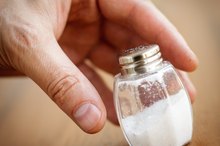Salt Cravings in Children
Americans have gone overboard when it comes to salt consumption. Even children are surpassing the 2,300 mg daily limit recommended in the 2010 Dietary Guidelines for Americans. The plethora of salty snacks and drinks surely contributes to this fact, but salt cravings might also be a sign of a serious medical condition. Children with a continual craving for salt might be exhibiting signs of adrenal insufficiency 1.
Adrenal Glands
The adrenal glands, located on the tops of your kidneys, play a pivotal role in your body. They work with other parts of the endocrine system to regulate production of certain hormones. One part of the glands, called the adrenal medulla, is involved with the familiar fight-or-flight responses to stress; it regulates the release of adrenaline. The functions of the adrenal cortex are the most important, however, because they affect metabolism, the immune system, blood pressure regulation and sex characteristics.
- The adrenal glands, located on the tops of your kidneys, play a pivotal role in your body.
- The functions of the adrenal cortex are the most important, however, because they affect metabolism, the immune system, blood pressure regulation and sex characteristics.
Salt and Aldosterone
Low Blood Pressure & Craving Salt
Learn More
Certain medical conditions cause adrenal insufficiency, which means the glands are not able to produce an adequate amount of hormones. The adrenal cortex produces both aldosterone and cortisol. The hormone aldosterone is essential because it regulates both sodium and potassium levels in the body. Low aldosterone levels cause excessive sodium loss through the urine, which can result in salt cravings over time.
- Certain medical conditions cause adrenal insufficiency, which means the glands are not able to produce an adequate amount of hormones.
- Low aldosterone levels cause excessive sodium loss through the urine, which can result in salt cravings over time.
Medical Conditions
Children with salt cravings might have Addison's disease, a form of adrenal insufficiency that can affect people of all ages. It got its name after Thomas Addison described the symptoms -- including salt cravings, low blood pressure, weight loss and fatigue -- in 1855. Children who continually crave salt might also have classic congenital adrenal hyperplasia, a genetic condition involving an adrenal enzyme deficiency 2. High blood pressure, vomiting and dehydration are also symptoms. It can be diagnosed during infancy, but the effects might not be present until puberty.
- Children with salt cravings might have Addison's disease, a form of adrenal insufficiency that can affect people of all ages.
- Children who continually crave salt might also have classic congenital adrenal hyperplasia, a genetic condition involving an adrenal enzyme deficiency 2.
Treatment
Drinking Salt Water for Adrenal Fatigue
Learn More
Getting the adrenal hormones to a normal level is the primary goal of treatment. Several medications are available to achieve this. Steroid medications known as glucorticoids function like the hormone cortisol. If the child's aldosterone level is insufficient, other medications are needed to regulate sodium and potassium in the body. Fludrocortisone is used for this purpose; it can be crushed or mixed with water to make it easier for children to consume. They might need to take extra doses of the medications when the body is under stress, such as during illness. This should be done under a physician's recommendation.
- Getting the adrenal hormones to a normal level is the primary goal of treatment.
- If the child's aldosterone level is insufficient, other medications are needed to regulate sodium and potassium in the body.
Related Articles
References
- "New England Journal of Medicine"; "Predisposing Factors for Adrenal Insufficiency"; Dr. Stefan Bornstein; May 2009
- New Zealand Dermatological Society Inc.; "Congenital Adrenal Hyperplasia"; 2009
- National Institutes of Health, MedlinePlus Medical Encyclopedia, "Acute adrenal crisis"
- Amrein K, Martucci G, Hahner S. Understanding adrenal crisis. Intensive Care Med. 2017;44(5):652-655. DOI:10.1007/s00134-017-4954-2
- Di Serafino M, Severino R, Coppola V et al. Nontraumatic adrenal hemorrhage: the adrenal stress. Radiol Case Rep. 2017;12(3):483-487. DOI:10.1016/j.radcr.2017.03.020
- Puar T, Stikkelbroeck N, Smans L, Zelissen P, Hermus A. Adrenal Crisis: Still a Deadly Event in the 21st Century. Am J Med. 2016;129(3):339.e1-339.e9. DOI:10.1016/j.amjmed.2015.08.021
- ACTH: What is a ACTH (Cortrosyn) Stimulation Test? ACTH (Cortrosyn) Stimulation Test - UCLA.
Writer Bio
Previously working for the North Carolina Community College System, Rachel Morgan has been a freelance writer and editor for over six years. She has a bachelor's degree in public health as well as a master's degree in English.









